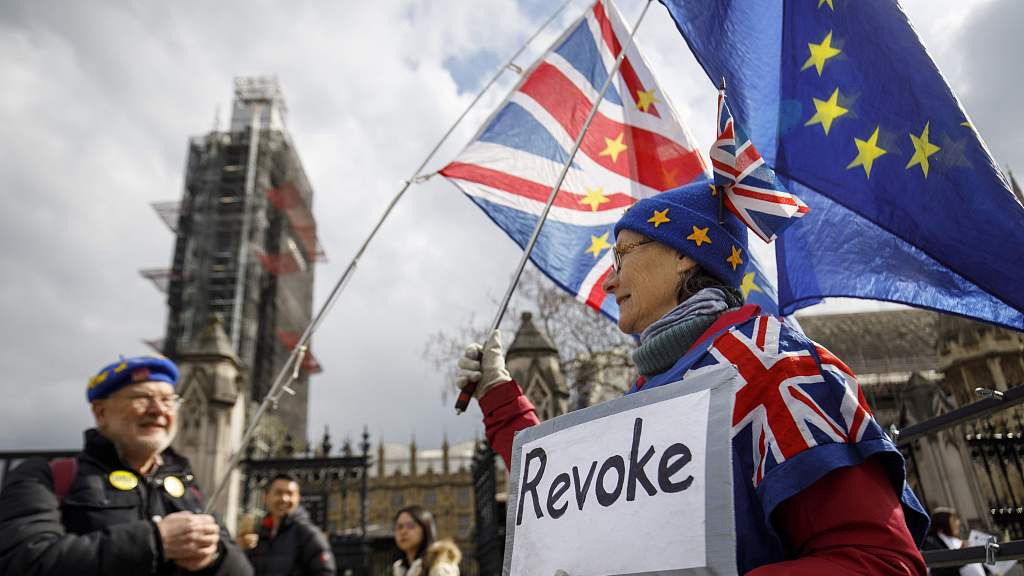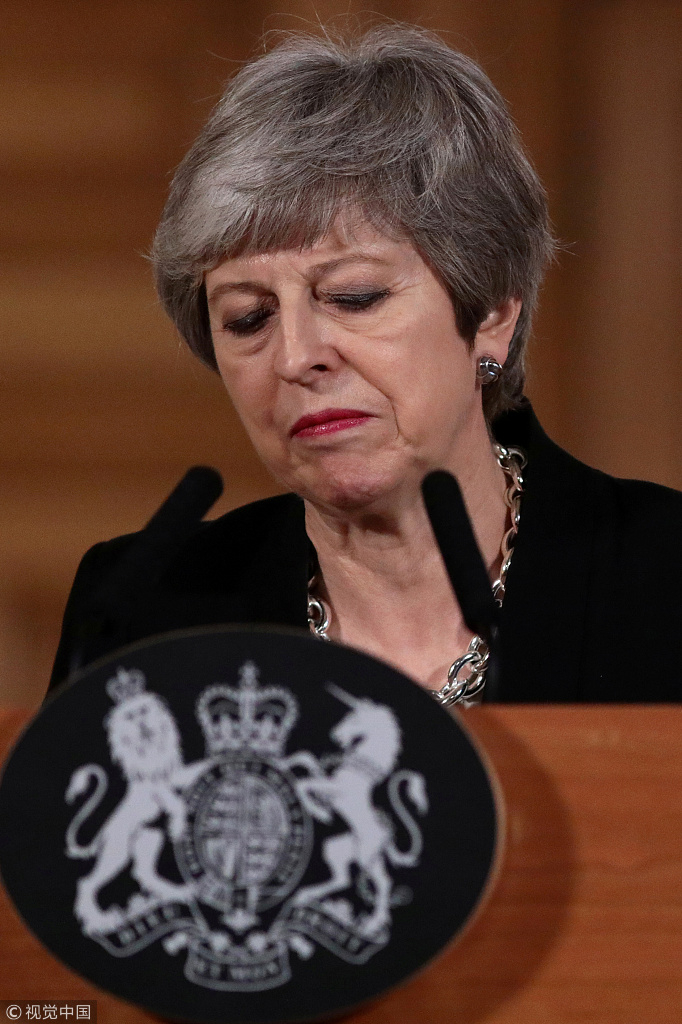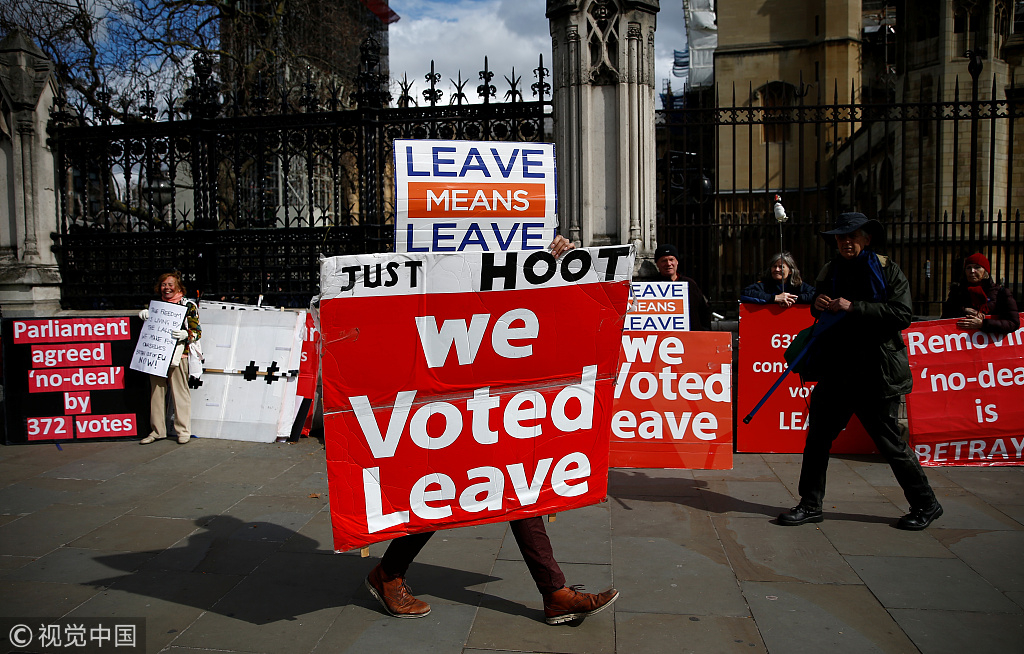
Opinion
11:08, 05-Apr-2019
Desperately seeking solutions! 'Last minute' panic in the Brexit game
Richard Fairchild

Editor's note: Richard Fairchild is an associate professor at the Finance of School of Management at the University of Bath. The article reflects the author's opinions, and not necessarily those of CGTN.
The UK is due to leave the EU on April 12, according to a previous deal reached by the two sides. Unfortunately, so far, no withdrawal deal is in place.
Having tried repeatedly to get her Brexit deal through at Westminster, UK Prime Minister Theresa May is now resorting, at last, to other measures. She has finally agreed to cross-party talks with the leader of the opposition Labour Party, Jeremy Corbyn, in an attempt to gain a compromise deal that hopefully will gain majority backing in the Commons. However, some members of her own party are aggrieved that she has time for Labour, but not for them!
Meanwhile, Labour's Yvette Cooper, fearing that we will crash out with a no-deal Brexit on Friday, April 12, 2019 (next week's EU-extended deadline day), proposed a motion to reject a no-deal Brexit, and to ask the EU for a further extension! Her motion was extremely narrowly agreed, by one vote! A total of 313 MPs voted for her motion, and 312 voted against. On the basis of this vote, May is being pushed into going back to the EU next week to ask for a further delay.

British Prime Minister Theresa May speaks at a news conference after a cabinet meeting outside Downing Street, London, April 2, 2019. /VCG Photo
British Prime Minister Theresa May speaks at a news conference after a cabinet meeting outside Downing Street, London, April 2, 2019. /VCG Photo
Of course, framing is very important in the Cooper motion. The choices were effectively framed as either asking for an extension, or crashing out with no-deal. This vote did not permit the possibility of considering other deals or options (including Theresa May's own deal) being agreed between now and next Friday's (April 12) deadline day.
The starkness of the binary choices between crashing out with a no-deal Brexit or asking for an extension only makes the equal split of voting in the Commons more dramatic. These two clear, and unambiguous options should have made "coalescence" of the House around an option (something that the EU are demanding) more likely.
However, MPs are as spilled as ever! Although 313 are in favor of asking for an extension, 312 are happy to crash out with no deal! Even more telling, of the 313 who voted for the extension, 229 are Labour MPs, and only 14 are Conservatives. Of the 312 who voted against asking for an extension, and are happy with a no-deal Brexit, 290 are Conservatives, and 9 are Labour. So, in contrast to many of the other votes in the Brexit drama, Cooper's motion clearly spilled the vote along Party lines.
So, May is going to be pushed to go to Brussels next week to ask the EU for a further extension to the deadline. This begs the question: if the vote had swung by two votes the other way, so that we would have had 313 rejecting Cooper's motion, thus in favor of a no-deal Brexit, and 312 being defeated in asking for an extension, would that have been honored?
That is, would we have ruled out asking for an extension, and now be agreeing to crash out without a deal next Friday? When the result of the vote is so narrow and balanced, it would only take a change in one or two voters' thinking, feelings, emotions or mood to swing the result. If the vote was repeated, would we get exactly the same result? It is incredible that such crucial decisions are subject to such fine margins!

A pro-Brexit protester demonstrates outside the Houses of Parliament in London, UK, April 4, 2019. /VCG Photo
A pro-Brexit protester demonstrates outside the Houses of Parliament in London, UK, April 4, 2019. /VCG Photo
Indeed, some Brexiteers have complained that Cooper's bill was pushed through in such a short space of time (four hours) without allowing for a proper reasoned and rational debate. This is symptomatic of the very fact that we are up against a very tight deadline, and this has created emotional and cognitive pressure in an emotionally intense situation, where MPs are scrabbling around for a way forward.
It is not clear, in any case, that the EU will allow a further extension, having already allowed the first extension (from March 29 to April 12). An EU spokesman has already said that the EU is growing tired and impatient with Britain, and that a no-deal Brexit is looking increasingly likely on April 12. Indeed, the EU has been preparing for a no-deal Brexit since December 2017, and EU leaders are holding an emergency meeting on April 10, just two days before Britain's scheduled exit.
Ironically, Yvette Cooper's motion may have just sealed our doom: one condition of the EU allowing an extension is that Theresa May can present a clear plan to the EU of how Britain will move forward towards Brexit during the extended time allowed, and that the House of Commons is able to "coalesce" around that plan: Cooper's vote reveals that the House is as divided as ever, so the very vote that narrowly proposes to ask for another extension may actually have destroyed those chances! In the light of this, Westminster continues desperately to seek out other options and solutions, and will have another round of indicative votes around varying proposals on Monday, April 8. Hopefully, this time, we will finally achieve an overwhelming agreement on a way forward!
The "Closure Motion" in favor of Cooper's Bill has passed through by 239 votes to 118, showing the level of support amongst the Peers in the House of Lords.
However, one member of the House of Lords has called this a "tyranny," reminding everyone that "The [bill] was actually passed [in the Commons] by one vote. And that one vote came from someone wearing a tag because they were released from prison!"
(If you want to contribute and have specific expertise, please contact us at opinions@cgtn.com.)

SITEMAP
Copyright © 2018 CGTN. Beijing ICP prepared NO.16065310-3
Copyright © 2018 CGTN. Beijing ICP prepared NO.16065310-3